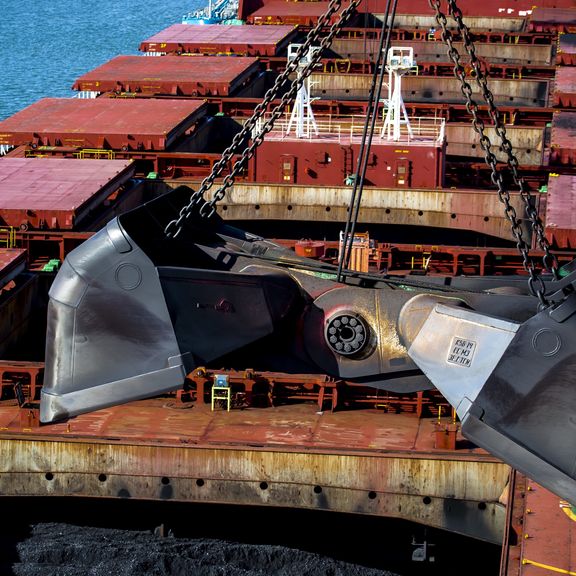
Iron ore
The port of Rotterdam is the crucial link in the iron ore supply chain for the steel industry in Germany, Austria and the Netherlands. Almost 50 percent of all iron ore throughput in Northwest Europe takes place in Rotterdam. This makes the port of Rotterdam by far the most important port for importing iron ore in this region.
The port of Rotterdam is ideally situated for the supply and transit of iron ore and bulk cargo. Advantages of the port include direct 24/7 access from the North Sea without the barriers of locks and tides. The port of Rotterdam is 23.65 metres (75 feet) deep, which makes it the only port in Northwest Europe that can also accommodate the largest dry bulk vessels such as the Valemax bulk carriers with a capacity of 400,000 tons DWT. And since size definitely makes a difference for iron ore transport, this means transport via the port of Rotterdam offers huge advantages compared with other ports.
Iron ore handling and storage terminals
There are two important iron ore terminals for the storage and transhipment of iron ore in the port of Rotterdam: EMO on the Maasvlakte and EECV in the Europoort. EMO’s dry bulk terminal is the largest terminal for iron ore and coal in Europe. EMO stores and tranships these bulk products for various customers in the European energy and steel industry. The state-of-the-art terminal design ensures that seagoing vessels are unloaded and/or loaded fast and thoroughly. A largely automated system guides the products through the terminal for storage, processing or transhipment. EECV is owned by the German steel concerns ThyssenKrupp Stahl and Hüttenwerke Krupp Mannesmann. The terminal processes the iron ore and coal for the blast-furnaces of these two steel producers.
Ship-to-ship transfer at buoys and dolphins
In addition to the transhipment facilities at the terminals, the port of Rotterdam also has extensive possibilities for safe and efficient ship-to-ship transfer at buoys and dolphins. The wide range of ship-to-ship handling facilities in the port of Rotterdam is unique. Various dry bulk terminals and independent providers have floating cranes which can transfer dry and liquid bulk cargo directly from one vessel to another at the buoys and dolphins. For example, transhipment from one deep sea vessel to another, or directly to a short sea or inland vessel.
Excellent connections in Europe
The port of Rotterdam is connected to an extensive intermodal network for the further transport of iron ore in Europe. Transport by rail and inland shipping are particularly attractive for dry bulk cargo, because of the possibility of transporting large quantities efficiently in one go. Between Rotterdam and Duisburg for instance, push units with 6 barges can transport 16,000 tons of coal and iron ore per trip on the Rhine. Via the Betuwe Route, a special freight railway between Rotterdam and the German border, cargo will reach Germany within 3 hours. The iron ore terminals in Rotterdam have their own rail and inland shipping facilities to ensure optimum efficiency.
More information? Contact:
